Guest Post – Riddles by Lari Don
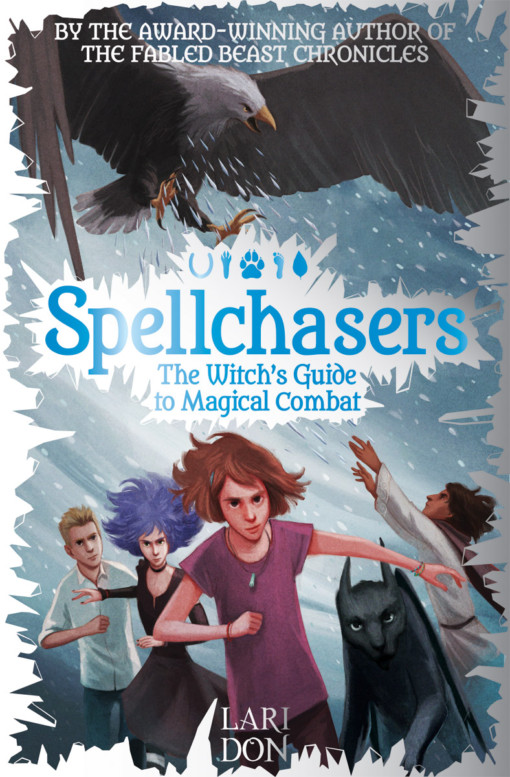 I am super excited to have the wonderful Lari Don on Tales today to celebrate the release of the final thrilling instalment of thie spellbinding Spellchasers trilogy!
I am super excited to have the wonderful Lari Don on Tales today to celebrate the release of the final thrilling instalment of thie spellbinding Spellchasers trilogy!
And today I have the lady herself, Lari Don, with a faboulous guest post about riddles…..
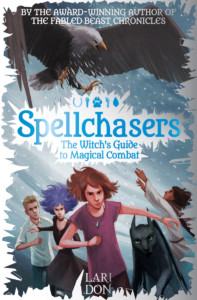 Molly’s shape-shifting curse is getting stronger and more unpredictable. As they search for a stone that can curb the Promise Keeper’s powers, the team faces a blizzard of powerful threats. Can they bring balance to the magical world, defeat the creatures that pursue them and finally break Molly’s curse? Or will darkness triumph over friendship? Taking her inspiration from traditional folklore and legends, Lari Don has imagined the Speyside landscape of her childhood as a world of magic and adventure – complete with shapeshifters, witches and a variety of mythical creatures.
Molly’s shape-shifting curse is getting stronger and more unpredictable. As they search for a stone that can curb the Promise Keeper’s powers, the team faces a blizzard of powerful threats. Can they bring balance to the magical world, defeat the creatures that pursue them and finally break Molly’s curse? Or will darkness triumph over friendship? Taking her inspiration from traditional folklore and legends, Lari Don has imagined the Speyside landscape of her childhood as a world of magic and adventure – complete with shapeshifters, witches and a variety of mythical creatures.
Riddles
I’ve always loved riddles.
I love words, but I also love maths. (I was the person who bounced out of maths exams saying ‘That was fun!’, thereby earning the eternal hatred of everyone in earshot…)
I love riddles because they use words, but they also have the logic and precision of mathematics. A riddle is like a maths problem dressed in a poem, leading beautifully and inexorably towards one and only one correct solution.
But if you don’t like maths or poetry, that’s fine. Because riddles also involve monsters and death!
In many of my favourite traditional tales, being able to answer a riddle (or sometimes ask a riddle) is the only way to save yourself from being eaten by a sphinx, or decapitated by an angry royal.
So, riddles can be fun to play with, but might also be a life-saving skill if you’re planning to star in any fairy tales or go on any quests…
I use riddles in almost all of my adventure books. The riddles in my first series, the Fabled Beast Chronicles, were asked by a variety of magical beings, including a ancient book, an Irish warrior, a mountainous dragon, and a committee of mermaids and selkies.
But in my most recent series, the Spellchasers trilogy, I wanted to get more personal with my riddles, not just have them as obstacles. So I included a sphinx in my team of young magical beings on a curse-lifting workshop, and I decided to curse him to lose his riddle. That gave me the chance to put riddles in the story, but also gave the riddling an extra emotional punch.
I create new riddles for the novels, partly because I enjoy making up riddles and partly because I weave the questions and the solutions into the fabric of the plot.
The answers to most of the riddles are connected, either directly or indirectly, to the wider narrative. But I also write the riddles with the character dynamics in mind, how they will discuss and debate and argue about the answer. Writing a riddle for a novel isn’t just about the problem and the solution, it’s also about the journey between the two.
I write all my riddles with my younger daughter. She is an incredible riddle master, with a very precise and sneaky mind. We start with the logic of the puzzle (it involves lots of lists and scribbling) then we craft the clues into a structure of a riddle – it doesn’t have to rhyme, but it’s nice if it has a bit of rhythm – and then we test the draft riddle on my older daughter, to see if she finds it too easy (cut out a clue), too hard (add another clue) or comes up with another answer entirely (in which case, we need to put in a line which makes that answer impossible… )
I also love to run riddle-writing workshops for young writers. (Though at the last workshop, the kids wanted to write a riddle about a spider, which was a difficult half hour for this arachnophobe…) One of the greatest pleasures of sharing riddles with kids is that they are usually much better at solving them than adults!
So, now that I’ve written to the end of my sphinx’s adventure, the next problem to solve is: how can I weave riddles into my next adventure?
 The Spellchasers trilogy is available and out now
The Spellchasers trilogy is available and out now
You can grab your copies here or from your local bookshop
About Lari Don
 Lari Don is a full-time children’s writer and storyteller. She grew up in the North East of Scotland and now lives in Edinburgh. She writes in her garden shed, helped by purring cats and hindered by lurking spiders. Lari has written more than 20 books, including adventure novels, picture books and retellings of traditional tales.
Lari Don is a full-time children’s writer and storyteller. She grew up in the North East of Scotland and now lives in Edinburgh. She writes in her garden shed, helped by purring cats and hindered by lurking spiders. Lari has written more than 20 books, including adventure novels, picture books and retellings of traditional tales.
You can find out more about Lari on her website – www.laridon.co.uk
Or why not follow Lari on her twitter – @LariDonWriter
Blog Tour
You can catch up or follow the rest of this fab blog tour at the following stops!
A huge thank you to Lari for a fab guest post and to Sarah at Floris Books for asking me to host.
Have you read any of the Spellchasers Trilogy? Did you enjoy? What did you love about it? Do you love riddles? I would love to hear from you! Why not leave a comment using the reply button at the top of the post or tweet me on twitter using @ChelleyToy !
Happy Reading!
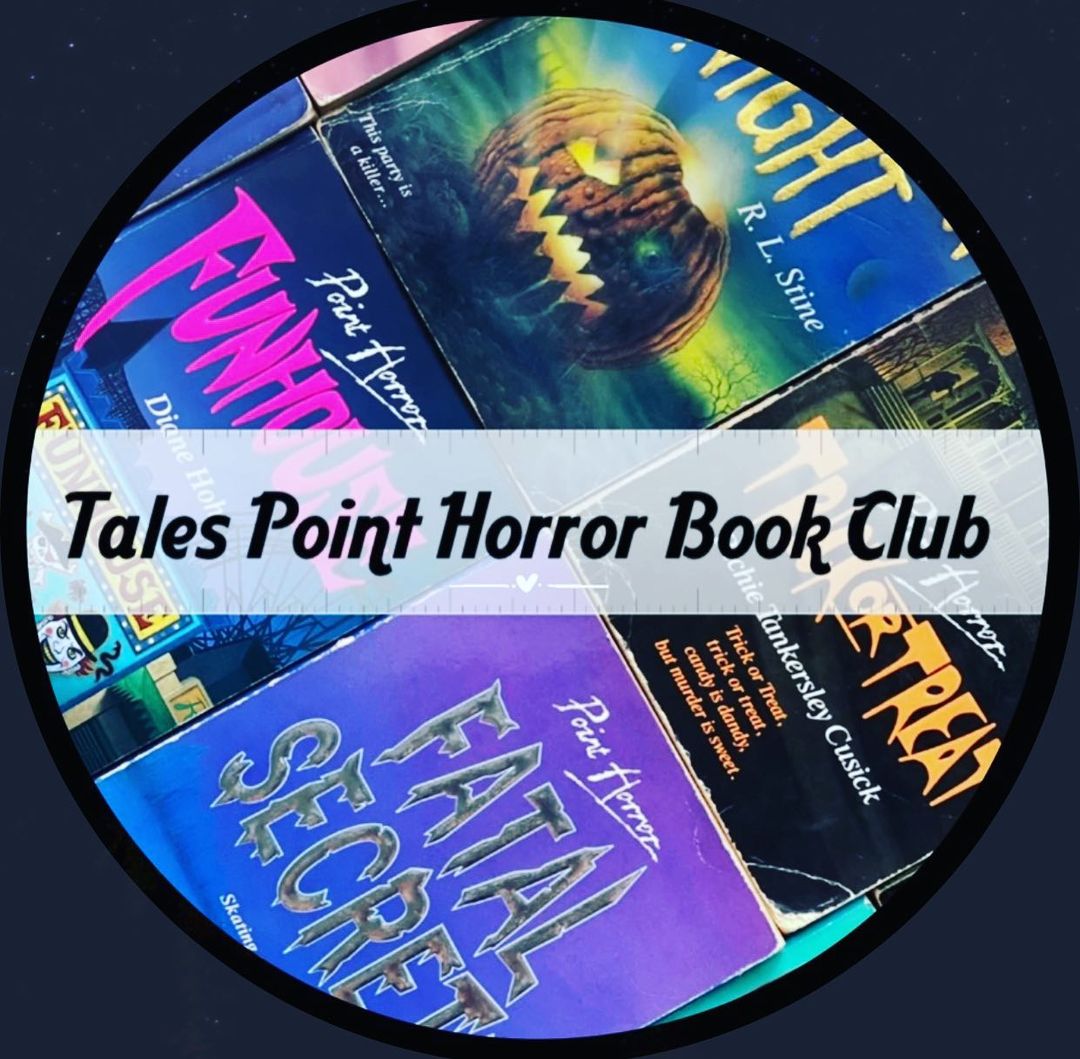
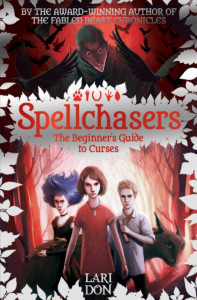
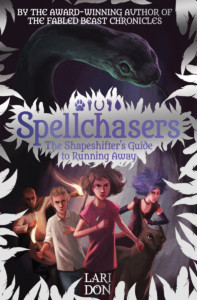
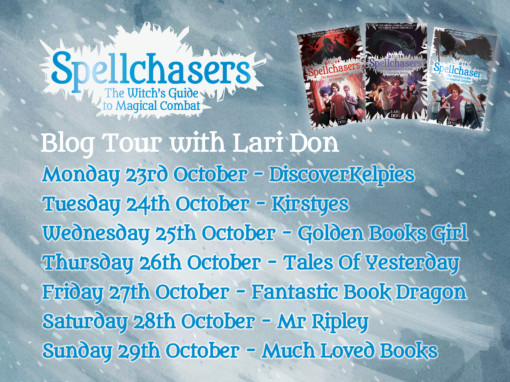



I thought the riddles in Spellchasers were really clever, so this was a really interesting read! I can’t solve any though ??
Amy xx
http://www.goldenbooksgirl.wordpress.com
I’m glad you enjoyed the riddles in Spellchasers, Amy, and that you liked finding out a bit of background about them in this post! I suppose don’t really expect (or even want?) the readers to stop and solve the riddles in the novel – I want them to be more interested in whether and how the characters solve the riddles and too keen to keep reading on! But I love working with kids at riddle workshops, where we ask, and solve, and create riddles, outside stories – it’s easier to give clues in real life than online! Lari